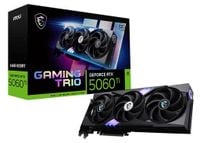Nvidia has officially launched its highly anticipated GeForce RTX 5060 and RTX 5060 Ti graphics processors, setting a new standard in the mainstream graphics card market. With the base model RTX 5060 expected to hit the shelves in May 2025 for a starting price of $299, the RTX 5060 Ti has already made its debut. Sales of the 16GB variant commenced on April 16, 2025, while the 8GB model is slated for release shortly thereafter.
The RTX 5060 Ti is being touted as the flagship model in this new lineup, built on the advanced GB206-3000 graphics processor. Both configurations of the RTX 5060 Ti, featuring 8GB and 16GB of RAM, boast identical technical specifications, including 4608 CUDA cores and a base clock speed of 2572 MHz. In contrast, the base RTX 5060 model is equipped with 3840 CUDA cores and utilizes a 128-bit memory bus with 8GB of GDDR7 memory, also maintaining a TDP of 150W.
In terms of technological advancements, the new RTX 5060 series supports Nvidia's latest DLSS 4 and Multi Frame Generation technologies, which promise to enhance gaming experiences significantly. Additionally, the cards support PCI Express 5 and DisplayPort 2.1b, ensuring they are well-equipped for future gaming demands.
Nvidia has also introduced mobile versions of the RTX 5060 for laptops, which will be available in devices starting at $1099. This move reflects Nvidia's strategy to cater to both desktop and mobile gaming markets, offering high-performance options across the board.
One of the most notable aspects of the RTX 5060 series is its pricing strategy. The RTX 5060 Ti 8GB will start at $379, a reduction of $20 from the RTX 4060 Ti 8GB's launch price of $399, indicating Nvidia's recognition of consumer sentiment regarding 8GB cards. The 16GB version of the RTX 5060 Ti is theoretically priced at $429, down $70 from the RTX 4060 Ti 16GB's starting price of $499.
In terms of specifications, the RTX 5060 Ti features 36 Streaming Multiprocessors (SMs), 144 Tensor Cores, and 36 RT Cores, delivering impressive theoretical maximums of 23.7 FP32 Boost TFLOPS and 72 RT TFLOPS while consuming only 180W. The memory bandwidth has also seen a significant increase, with the new cards featuring 28 Gbps GDDR7 memory, a considerable upgrade from the RTX 4060 family’s GDDR6 memory.
Benchmarks for the RTX 5060 Ti 16GB reveal promising performance improvements over its predecessor. In tests like 3DMark Speed Way, the RTX 5060 Ti 16GB showed a 28% generational increase in ray-traced rendering capabilities. In the game Cyberpunk 2077, it was approximately 39% faster than the original RTX 4060 Ti, showcasing its enhanced performance in demanding titles.
However, the competition remains fierce. The AMD RX 7800 XT has been noted to outperform the RTX 5060 Ti in several tests, making it crucial for Nvidia to ensure competitive pricing and availability. The RX 7700 XT also poses a significant challenge, with performance margins of just a few frames per second between the two cards.
In practical gaming scenarios, the RTX 5060 Ti 16GB has demonstrated its capabilities across various titles. In Forza Motorsport, for instance, it outperformed the RTX 4060 Ti 8GB by a staggering 93% at FHD and 162% at QHD thanks to its advanced RT Cores and larger VRAM capacity. This performance leap highlights the card's potential for 1080p and 1440p gaming, especially when DLSS is enabled.
Despite these advancements, Nvidia's decision to offer an 8GB variant has sparked some controversy among gamers, many of whom feel that 8GB of VRAM is inadequate for modern gaming demands. Given the increasing complexity of games, the 16GB model is recommended for those looking to future-proof their investment.
In Russia, the RTX 5060 Ti has already made its way to retailers, albeit at prices significantly higher than those in the US. The Palit GeForce RTX 5060 Ti Infinity 3 is priced at 55,000 rubles, while the MSI GeForce RTX 5060 Ti Gaming OC is available for 57,000 rubles, and the premium MSI GeForce RTX 5060 Ti Gaming Trio OC costs 60,000 rubles. This pricing disparity highlights the challenges of global supply chains and market variations.
As Nvidia continues to navigate the competitive landscape of graphics cards, the RTX 5060 series appears well-positioned to capture a significant share of the market. With its blend of performance, advanced features, and competitive pricing, the RTX 5060 Ti is poised to be a popular choice among gamers looking for a powerful yet affordable graphics solution.
In conclusion, while the RTX 5060 Ti may not be without its challenges, its performance advancements and pricing strategies suggest that Nvidia is committed to meeting the evolving needs of gamers. As the graphics card market continues to evolve, it remains to be seen how well the RTX 5060 series will fare against its competitors in the coming months.









